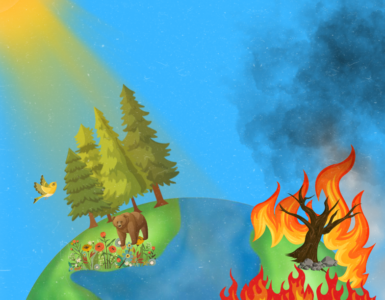It has been a year since we celebrated the condemnation of the neonazi party, Golden Dawn, as a criminal organization. It has been a year since we declared with pride that the 7th of October 2020 was a victory of the antifascist movement and of democracy.
And now, a year later, what is the situation in Greece? Is it possible we rested on our laurels and on that triumphant moment and forgot that resistance to fascism is never-ending? Is it maybe too late or too early to sound the alarm?
It is a historically established and indisputable fact that ideologies do not cease to exist with the fall of the organizations or people embodying them. An ideology is by definition an organized collection of ideas, a holistic vision that seeks to answer social questions and bring about change. An ideology is also something very abstract and intangible, which makes the struggle for the disappearance of an ideology, like that of fascism, extremely difficult.
Indeed, Golden Dawn’s leadership, which based its criminal activities on fascist and neo-Nazi ideals, is currently in prison (most of them at least), but the ideology that persuaded a portion of the electorate to put criminals in Parliament is not imprisoned. The reality is that these very ideals are deeply rooted in the fabric of Greek society.
The snake of fascism lays its eggs in the country’s most neglected communities, in the areas with the lowest standard of living and social status. There, after laying its eggs, it lets the surrounding conditions do their work and it awaits for a general state of political, economic and social instability (a pandemic, perhaps, that changed everything we took for granted) to hatch. Because we must not forget that fascism is born in chaos; in chaos, where it will heroically promise to provide the solution. It will promise to “save the nation and its traditions”, regardless of what this may mean, because the end justifies the means…
This may sound as an exaggeration to some, however, I think it is enough to take a look at the very recent events of extreme right-wing violence in Thessaloniki. Arsenals in schools, students doing the Nazi salute and groups attacking anti-fascist demonstrators are familiar patterns that bring back memories of dark ages. We learn that far-right action groups “gather” young people in the most underprivileged places of the country, while at the same time, the criminal organization that was found guilty of serious offences, maintains media accounts and hopes for “a new starting point for regrouping and counterattacking”.
There is overwhelming proof that the heirs of Golden Dawn are acting unhindered, at a time when the government’s reflexes on this kind of violence seem to be on hold. This, combined with the appointment of three lawmakers with occasional nodes to far-right ideologies, makes some of us wonder how far right the ruling party really is.
Unfortunately, all these are not just scenarios, but the reality, unfolding right before our eyes. If we want to be called human, we owe it to human kind to resist fascism in every way and with relentless zeal, as it will constantly be reborn from its ashes. And we must talk, talk about fascism with the appropriate severity for this deadly phenomenon. Talk constantly and with courage about what is happening, until everyone understands how we are aware of them and that we will not turn our heads to the impending threat. And maybe then, we will have a chance to save the fragile democracy that needs constant protection – if it is not too late.
Jason Stanley, a writer and philosophy professor at Yale, says his mother always told him: “Sense when it’s time to leave to avoid a dangerous situation. Because when the situation is outright dangerous, it is too late to escape.” I will dare to respond that you have to sense when it is time to stand in the way of a dangerous situation and not run away. Because we are not done with fascism and we would be damned if we are complacent, if we try to run to avoid it or if we close our eyes to what is happening.









Add comment